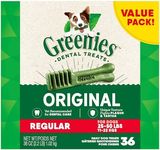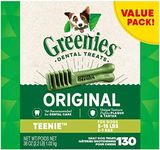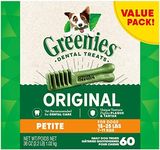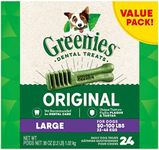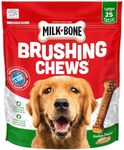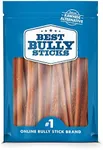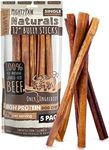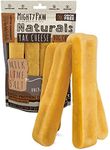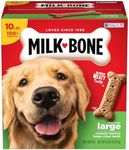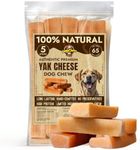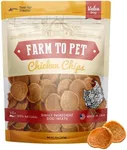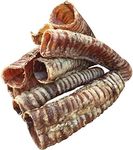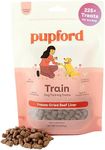Buying Guide for the Best Chews For Dogs
Choosing the right chews for your dog is essential for their dental health, mental stimulation, and overall well-being. The right chew can help keep your dog's teeth clean, provide a satisfying outlet for their natural chewing instincts, and prevent destructive behavior. When selecting a chew, consider your dog's size, age, chewing habits, and any dietary restrictions they may have. Here are some key specifications to help you make the best choice for your furry friend.SizeThe size of the chew is crucial for safety and effectiveness. A chew that is too small can be a choking hazard, while one that is too large may be difficult for your dog to handle. For small dogs, choose smaller chews that they can comfortably fit in their mouths. Medium-sized dogs will benefit from medium-sized chews, and large dogs need larger chews that they can gnaw on without swallowing whole. Always supervise your dog with a new chew to ensure it is the right size and safe for them.
HardnessThe hardness of the chew affects how long it will last and how it will benefit your dog's teeth. Softer chews are suitable for puppies, senior dogs, or those with dental issues, as they are easier on the teeth and gums. Medium-hard chews are good for average chewers and provide a balance between durability and dental benefits. Hard chews are best for aggressive chewers who need something tough to keep them occupied. Always monitor your dog to ensure the chew is not causing any dental damage.
IngredientsThe ingredients in the chew are important for your dog's health and dietary needs. Natural chews made from single ingredients, like bully sticks or rawhide, are often preferred for their simplicity and lack of additives. For dogs with allergies or dietary restrictions, look for chews made from hypoallergenic ingredients or those specifically formulated for sensitive stomachs. Always check the ingredient list to avoid any harmful substances or allergens.
FlavorFlavor can make a chew more appealing to your dog and encourage them to use it. Common flavors include beef, chicken, bacon, and peanut butter. If your dog is a picky eater, try different flavors to see which one they prefer. Some chews are also infused with flavors to make them more enticing. Choose a flavor that your dog enjoys to ensure they get the most out of their chew.
DurabilityDurability is important for ensuring the chew lasts long enough to provide benefits without being quickly destroyed. For light chewers, less durable chews may be sufficient and can be more cost-effective. Moderate chewers need chews that can withstand some wear and tear, while heavy chewers require highly durable chews that won't break apart easily. Consider your dog's chewing habits and choose a chew that matches their strength and persistence.
Dental BenefitsChews can help maintain your dog's dental health by reducing plaque and tartar buildup. Look for chews that are specifically designed to promote dental hygiene, such as those with ridges or textures that help clean teeth as your dog chews. Dental chews can be a great addition to regular brushing and professional cleanings. If dental health is a priority, choose chews that are endorsed by veterinarians or have dental health claims.
